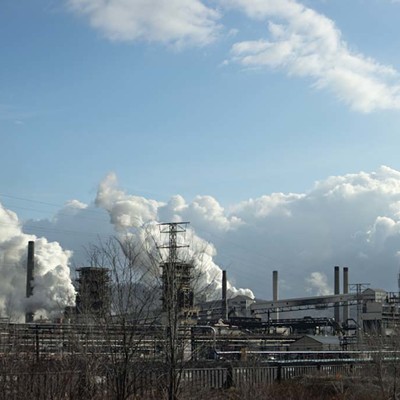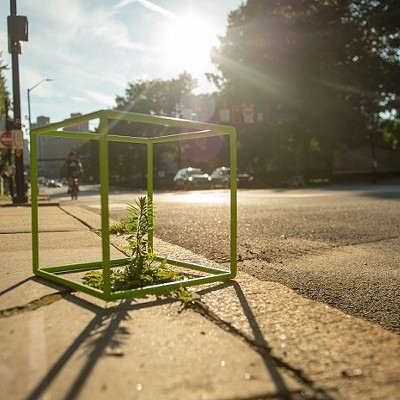When it was built a century ago, the house at 710 N. St. Clair St. didn't have much, if any, insulation. Nor did most American buildings constructed throughout the 20th century: Why insulate when coal and gas were so cheap?
But thanks to a cutting-edge effort by a local renovator, 710 North St. Clair, in East Liberty, should conserve gas and electricity better than every other older single-family home in town.
Michael Merck, owner of West Penn Energy Solutions, intends the wood-framed, brick-faced building to be a "net-zero house" -- one that produces as much energy as it uses.
Early last year, Merck and his crew gutted the three-story structure, owned by nonprofit East Liberty Development, Inc. They insulated it out the wazoo, and sealed it so warm air couldn't leak out nor cold air sift in. They placed windows to exploit natural light and employed energy-miser appliances and low-flow water fixtures. The first floor has radiant-floor heating, with baseboard heating on upper floors. And they're adding 18 rooftop photovoltaic solar panels to generate electricity, and two solar-thermal panels to heat water.
All told, says Merck, the eventual owner-occupant of this three-bedroom, 2,800-square-foot home could have annual gas bills as low as $200 -- less than a warm January's worth for some nearby domiciles. Electric bills should be effectively zero, with credits and buybacks for solar kilowatts generated on-site more than offsetting the cost of electricity the homeowner buys when the sun isn't shining.
The place looks good, too, with its tiled kitchen and bath, and original mahogany inlays accenting the oak flooring on the first floor. Occasionally, the renovation sacrifices aesthetics to performance. For example, the second floor's water-based, wood-floor finish isn't high-gloss. But it also doesn't emit nasty vapors like a standard high-gloss finish. "Somebody who's gonna buy this house is probably going to care more about air quality than ‘Are the floors perfect?'" says Merck.
The combination of old and new is embodied in a second-floor hall closet. Behind the original pine door is mounted a heat-recovery ventilator (donated by Lennox) that improves both air quality and energy efficiency. The high-tech device controls how the house "breathes" by capturing heat from exhaust air and adding it to freshly intaken air, while eliminating moisture that could cause mold or rot.
Pittsburgh already has a new net-zero home, built on the South Side last year by Sota Construction (and listing for $489,000). And thousands of households around the U.S. live "off the grid," with no utility hook-ups. But with its July 7 ribbon-cutting, 710 N. St. Clair will become Pittsburgh's first net-zero renovation.
The house is among those ELDI is letting rehabbers fix up and market on their own. But it goes well beyond ELDI's standard "green renovations."
The project "looks really good," says Nina Baird, who teaches a graduate-level class called Zero Energy Housing in Carnegie Mellon University's School of Architecture.
However, net-zero design doesn't guarantee net-zero performance. Baird says studies show that occupant behavior -- turning off lights, reining in thermostats -- can cause energy usage to vary three-fold. "Generally people learn to live in a net-zero house over time," she says. "It's not something easy or automatic."
Merck's net-zero calculations, for instance, allow for heating to 68 degrees in the winter -- cooler than many prefer. And while the house in summer will retain night-time coolness effectively, without energy-sucking central air-conditioning, this spring the indoor temp reached 80 on days when outside temperatures hit 90-degrees-plus, says Merck. "It's a different way to live," he says.
But can more people live this way?
Merck is asking $280,000 for the house. While that won't leave much profit from this experiment for him, it's still slightly above market. Yet with utility savings figured in, it's a long-term bargain for the homeowner. The city's Urban Redevelopment Authority is even offering a special supplementary second mortgage of up to $35,000, with payments keyed to the owner's savings from solar energy.
The market for net-zero houses is likely to depend more on rising energy prices than on homebuyers en masse suddenly developing a conservation ethic. But Merck has fielded enough interest in 710 N. St. Clair that he's begun work on a similar renovation … right next door.














